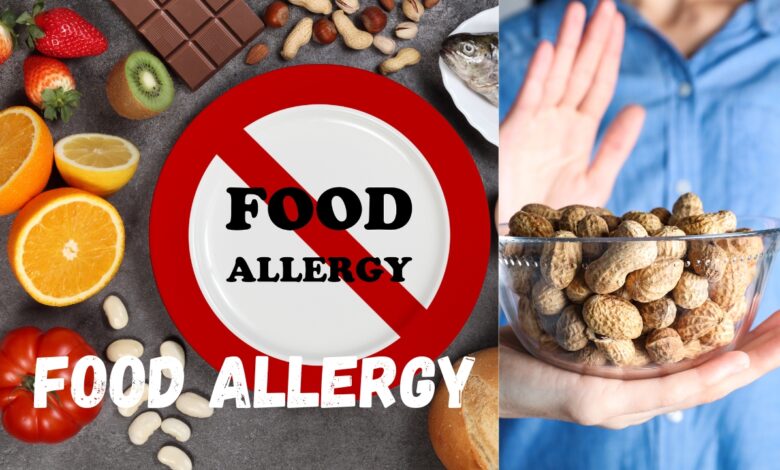Understanding Food Allergies and Intolerances 2024

Food is a normal necessity and a supply of comfort and pleasure. However, for people with meal allergies or intolerances, ingesting can every now and then become a reason for distress and fitness issues.
Understanding the difference between food hypersensitive reactions and intolerances, spotting their signs, and mastering how to control them can empower people to live healthier lives. This article delves into these crucial aspects, imparting a complete manual to know-how and navigating meals-related sensitivities.
What Are Food Allergies?
Food allergies arise while the immune machine mistakenly identifies a specific meal protein as dangerous and triggers an immune response. This reaction can vary from mild symptoms to excessive, existence-threatening conditions including anaphylaxis. Common meals allergens include:
- Milk
- Eggs
- Peanuts
- Tree nuts (e.G., almonds, walnuts)
- Fish
- Shellfish
- Wheat
- Soy
In maximum cases, food hypersensitive reactions are lifelong, although a few, together with those to milk or eggs, may be outgrown over time.
What Are Food Intolerances?
Unlike meal allergies, meal intolerances do not contain the immune gadget. Instead, they arise whilst the digestive gadget struggles to break down a selected food or aspect. Common culprits include:
- Lactose: Found in dairy products, inflicting lactose intolerance because of the absence or deficiency of the enzyme lactase.
- Gluten: Found in wheat, barley, and rye, triggering symptoms in individuals with non-celiac gluten sensitivity or celiac disease.
- Food components: Such as monosodium glutamate (MSG) or sulfites, which can also motive reactions in sensitive people.
Symptoms of meal intolerances are generally much less severe than the ones of food allergic reactions however can extensively affect quality of existence.
Common Symptoms of Food Allergies and Intolerances
Food Allergy Symptoms
Food allergic reactions can occur within mins to a few hours after ingestion. Symptoms may also include:
- Skin reactions: Hives, itching, or eczema.
- Respiratory troubles: Wheezing, nasal congestion, or issue breathing.
- Gastrointestinal signs: Nausea, vomiting, diarrhea, or belly pain.
- Cardiovascular signs: Dizziness, fainting, or a fast drop in blood pressure.
- Anaphylaxis: An extreme, life-threatening allergy requiring immediate clinical attention.
Symptoms include difficulty respiration, swelling of the throat, and a sudden drop in blood stress.
Food Intolerance Symptoms
Symptoms of meal intolerances are normally restrained to the digestive system and may increase over numerous hours. Common symptoms consist of:
- Bloating
- Gas
- Diarrhea
- Constipation
- Stomach cramps
- Nausea
Unlike food allergies, food intolerances aren’t existence-threatening, however they can reason tremendous pain.
Managing Food Allergies
Managing food hypersensitive reactions involves strict avoidance of the allergen, at the side of emergency preparedness in case of accidental exposure.
1. Avoidance
- Read Labels: Check component lists cautiously for hidden allergens.
- Ask Questions: When dining out, inquire about meals practise to keep away from cross-infection.
- Use Allergen-Free Alternatives: Substitute allergens with safe options, such as almond milk for cow’s milk or chickpea flour for wheat flour.
2. Emergency Preparedness
- Carry an EpiPen: Individuals with intense allergies have to continually have an epinephrine automobile-injector.
- Inform Others: Make pals, own family, and coworkers aware of the allergic reaction and the way to reply in an emergency.
- Wear Medical Identification: A scientific alert bracelet can provide vital facts all through an emergency.
Managing Food Intolerances
While food intolerances do no longer pose on the spot dangers to fitness, managing them effectively is crucial for long-time period well-being.
1. Dietary Adjustments
Identify Triggers: Keep a meals diary to pinpoint intricate foods.
Use Enzyme Supplements: For lactose intolerance, lactase enzyme dietary supplements can help digest dairy.
Explore Alternatives: Opt for gluten-free grains, dairy-loose merchandise, and herbal food additives.
2. Moderation and Timing
Portion Control: Small quantities of the offending meals can be tolerated by a few people.
Space Out Meals: Avoid consuming ingredients near collectively to reduce symptoms.
3. Consultation with Specialists
Working with a dietitian or nutritionist can help broaden a balanced diet whilst keeping off trigger foods.
Living with Food Allergies and Intolerances
Life with meal sensitivities calls for cautious making plans however is totally viable with the right approach. Here are some hints:
Educate Yourself and Others
- Stay knowledgeable about contemporary meals safety practices and products.
- Teach youngsters with meals allergic reactions a way to understand signs and are looking for assistance.
Plan Ahead
- When touring, research eating places and grocery shops that cater in your nutritional desires.
- Pack secure snacks and meals to keep away from surprising conditions.
Advocate for Change
- Push for higher food labeling legal guidelines and allergen-free options in schools, offices, and public spaces.
- Join assist agencies to hook up with others facing similar challenges.
When to Seek Medical Attention
Seek clinical attention if symptoms boost or do now not improve with widespread management. For severe allergies, immediate intervention is crucial. Persistent signs and symptoms of food intolerances can also warrant similar research to rule out underlying situations.
Understanding the Emotional Impact of Food Allergies and Intolerances
Living with food hypersensitive reactions or intolerances will have a huge emotional and mental effect. The want to constantly display meals consumption, keep away from cross-contamination, and prepare for emergencies may be demanding and overwhelming. This section explores how individuals and families can manipulate these demanding situations correctly.
Coping with Anxiety and Stress
The worry of unintentional exposure is a not unusual issue for individuals with intense food allergic reactions. Social conditions, eating out, and touring can come to be assets of anxiety. To manage these fears:
- Practice Mindfulness: Techniques including meditation and deep respiratory can reduce strain degrees.
- Build Confidence: Educating yourself approximately your circumstance and emergency reaction steps can increase self assurance and reduce anxiety.
- Seek Support: Joining a neighborhood or online support institution can provide emotional alleviation and sensible recommendations from others dealing with similar challenges.
Fostering a Positive Mindset
Having meals hypersensitive reactions or intolerances no longer should restrict one’s entertainment of life. By focusing on what is inside control, people can foster a high-quality outlook:
- Explore New Recipes: Experiment with allergen-loose or intolerance-friendly recipes to make meals enjoyable.
- Celebrate Progress: Recognize and appreciate the attempt it takes to control your circumstance.
- Stay Connected: Engage with cherished ones and keep a sturdy social network to keep away from feelings of isolation.
Supporting Children with Food Allergies or Intolerances
When youngsters are diagnosed with allergic reactions or intolerances, it’s essential to provide them with training and help to navigate their situation expectantly.
Educating Children
- Teach Basic Safety: Ensure children recognize what foods to keep away from and how to perceive signs of a response.
- Role-Play Scenarios: Practice conditions like dining out or attending faculty occasions to construct their self belief.
- Involving Schools and Caregivers
- Communicate Clearly: Inform teachers, caregivers, and different mother and father approximately your baby’s condition and emergency protocols.
- Provide Safe Snacks: Send allergen-unfastened snacks on your infant to revel in at some stage in school events or playdates.
Advancements in Food Allergy Research
Ongoing research in meals allergic reactions and intolerances gives hope for progressed remedies and understanding. Emerging procedures consist of:
- Immunotherapy: Gradual exposure to allergens below medical supervision to build tolerance.
- Biological Treatments: Targeted therapies to modify the immune device’s reaction to allergens.
- Improved Diagnostic Tools: Advances in technology are making meals hypersensitivity and intolerance diagnoses extra accurate and handy.
Empowering Yourself Through Knowledge
Knowledge is strength in relation to dealing with food allergic reactions and intolerances. Staying knowledgeable about new treatments, merchandise, and protection measures can assist individuals make informed selections.
Resources like online blogs, academic substances, and consultations with experts play an important role in empowering people to live healthy and enjoyable lives in spite of their dietary restrictions.
Living with hypersensitive reactions or intolerances can be hard, however with awareness, practice, and a proactive method, people can overcome these boundaries and experience a vibrant existence.
Also Read:Benefits of deep breathing exercises
Conclusion
Understanding hypersensitive reactions and intolerances is essential for recognizing signs and symptoms, obtaining an accurate analysis, and implementing effective control techniques. Whether warding off allergens or adjusting your food regimen for intolerances, dwelling a full and wholesome lifestyle is possible with proper awareness and aid.
By taking proactive steps and operating intently with healthcare providers, individuals with meal sensitivities can revel in the pleasures of ingesting at the same time as minimizing dangers and discomfort.




